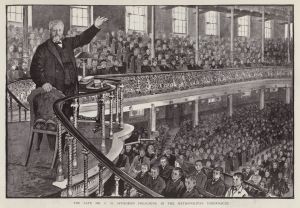Reformed Baptists
Reformed Baptists (also known as Particular Baptists or Confessional Baptists),[1] are Baptists that hold to a Calvinist soteriology (salvation belief).[2] Depending on the denomination, Calvinistic Baptists adhere to varying degrees of Reformed theology, ranging from simply embracing the Five Points of Calvinism, to accepting a modified form of federalism; all Calvinistic Baptists reject the classical Reformed teaching on infant baptism. While the Reformed Baptist confessions affirm views of the nature of baptism similar to those of the classical Reformed, they reject infants as the proper subjects of baptism.[3] The first Calvinistic Baptist church was formed in the 1630s.[1] The 1689 Baptist Confession of Faith is a significant summary of the beliefs of Reformed Baptists.[1] The name "Reformed Baptist" dates from the latter part of the 20th century to denote Baptists who retained Baptist ecclesiology, and reaffirmed Reformed biblical theology, such as Covenant theology.

See also
Bibliography
- Brackney, William H (2009), Historical Dictionary of the Baptists (2nd ed.), Scarecrow Press, ISBN 978-0-8108-5622-6, retrieved 17 November 2012.
- Weaver, C Douglas (2008), In Search of the New Testament Church: The Baptist Story, Mercer University Press, ISBN 978-0-88146-105-3.